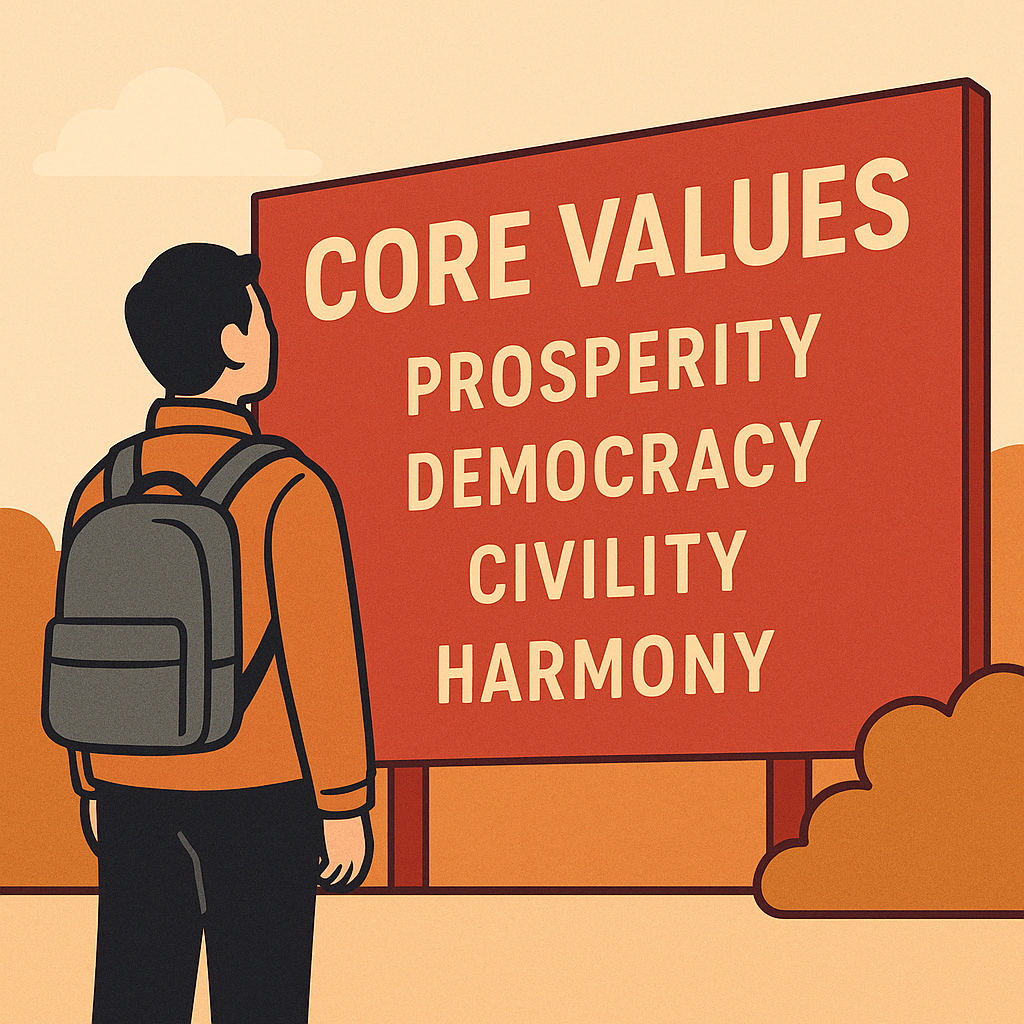Values Shouted, Truth Silenced
Subtitle:
China proudly displays its core values everywhere—from billboards to textbooks. But behind the slogans lies a society where real justice, critical thought, and historical truth remain elusive.

In today’s China, “core socialist values” are everywhere—plastered on walls, chanted in classrooms, echoed by state media. But the louder these words are spoken, the more one wonders: do they reflect the society’s reality, or simply mask its contradictions?
When a regime proclaims morality while suppressing dissent, when it shouts about justice but tolerates no accountability, slogans cease to inspire. They become tools of control, not change.
When Values Become Window Dressing
Ideally, values are what guide a society toward justice, equality, and dignity. In practice, China’s “core values” often serve another purpose: preserving the illusion of harmony.
Questioning government policy is easily labeled as “destabilizing.” Alternative voices are dismissed as unpatriotic. In a society where conformity is rewarded and deviation punished, “values” lose their moral weight—they become camouflage.
Institutional Mediocrity: The Tyranny of Obedience
One of the system’s most damaging features is reverse selection—a mechanism where the most loyal, not the most capable, rise through the ranks. Independent thinkers, those willing to speak inconvenient truths, are systematically filtered out.
What’s left is a bureaucratic class that excels not at solving problems, but at avoiding blame. Competence becomes a liability; caution is the key to survival.
This results in a self-replicating cycle of mediocrity, where the system is preserved at all costs—even if the public interest is quietly sacrificed.
The Banality of Complicity
Hannah Arendt coined the term “the banality of evil” to describe how ordinary people enable injustice—not out of hatred, but through obedience and indifference.
In today’s China, many officials and educators might say, “I’m just doing my job.” But when “the job” is to suppress free speech, distort history, or maintain silence in the face of suffering, neutrality becomes complicity.
Evil doesn’t always arrive with violence. Sometimes it creeps in with paperwork, slogans, and a refusal to ask hard questions.
A War Remembered, a People Forgotten
The Korean War—framed in China as the “War to Resist America and Aid Korea”—remains a pillar of national pride. But if we strip away propaganda, difficult questions remain: What did this war truly achieve? Who paid the price?
Hundreds of thousands of Chinese soldiers died. The North Korean regime, which China fought to preserve, became one of the most brutal dictatorships in modern history. Ordinary North Koreans gained neither peace nor prosperity—only isolation and repression.
And yet, this war is still celebrated, while its unintended consequences are ignored.
Who Chose Whom: The Party or History?
The Communist Party often claims that it was chosen by history. But was it chosen—or did it choose the narrative?
During the Second World War, the Nationalist government led the main resistance against Japan. After 1949, China’s rapid development aligned with global trends: industrialization, technology transfer, and demographic momentum. It is difficult to say whether such growth would not have occurred under a different government.
Meanwhile, the Party’s record is not without catastrophe: the Great Leap Forward led to tens of millions of deaths by starvation; the Cultural Revolution crushed a generation’s spirit; and 1989 remains a forbidden topic.
To understand modern China, we must resist simplistic origin stories.
Why We Remember Some Atrocities—And Forget Others
Walk through Nanjing, and you’ll find a vast memorial commemorating the Nanjing Massacre—Japan’s wartime atrocities are rightfully remembered. But where are the memorials for China’s own tragedies?
There is no monument for the Great Famine. No museum for the Cultural Revolution’s victims. No plaque to remember those killed in 1989.
The state demands we “never forget” foreign cruelty, yet insists on forgetting domestic suffering. But true healing requires acknowledging both.
The Government Is Not the Motherland
In China, the phrase “the motherland” is often invoked with deep reverence. The problem is not patriotism—but how it’s used.
The government routinely equates criticism with treason. Question a policy, and you’re told you hate your country. But governments are not sacred. They are public institutions. They serve the people, not the other way around.
Loving one’s country should include the courage to confront its flaws. A real mother nurtures, protects, and accepts hard truths—not demands silence in the face of harm.
Conclusion: What Kind of Country Do We Want to Be?
This is not a call for cynicism. It is a call for honesty.
If we want a society where values matter—where dignity, truth, and freedom are not just words—we must start by breaking the silence. We must question the use of slogans, challenge the systems that reward mediocrity, and refuse to let history be curated for convenience.
Values shouted at every corner lose their meaning when the truth is buried in silence. But if enough people choose to speak, maybe one day, those values will no longer ring hollow.